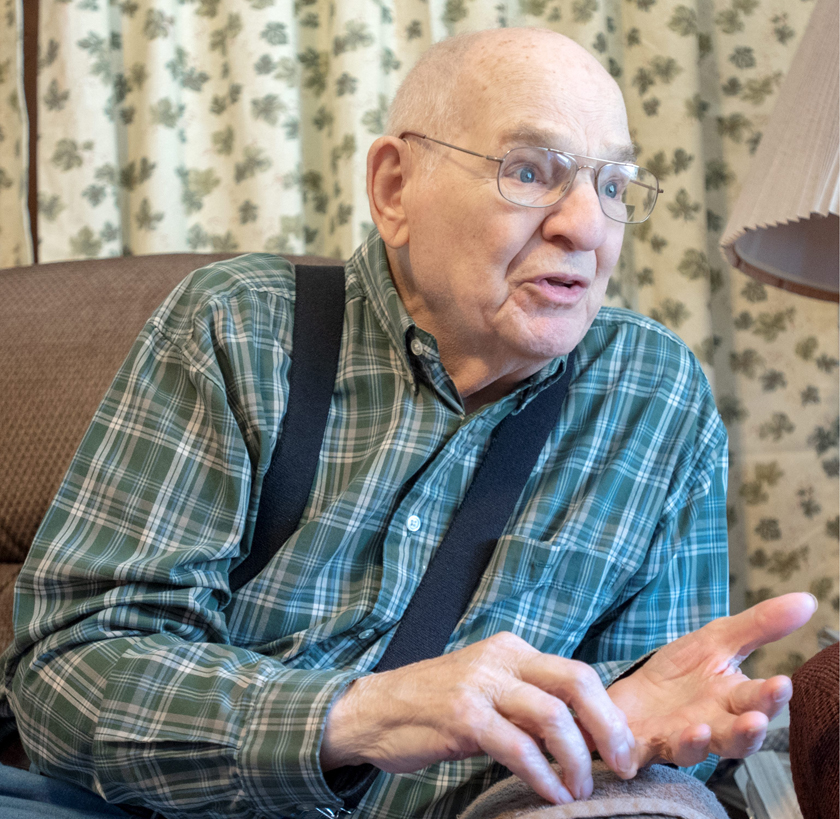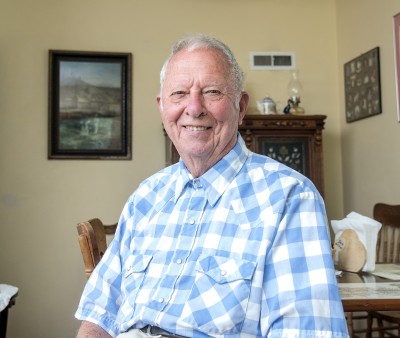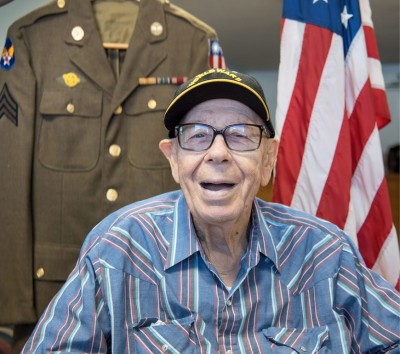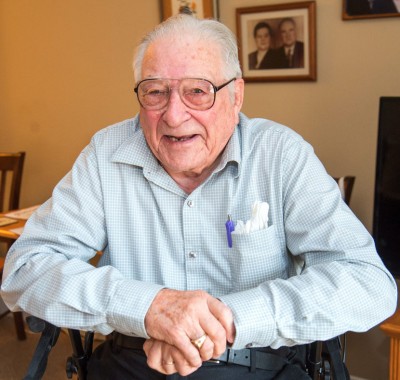Leon Eisenhauer
By Paul Wood

Photo By Robin Scholz/The News-Gazette
MAHOMET — Cold Warrior Leon Eisenhauer worked with coded messages in the 1950s, sometimes in NATO trucks not far from the East German border.
When he was transferred into the engineering corps, an officer told him not to shoulder his rifle.
“But in those trucks, I had a carbine with me,” Eisenhauer said.
Eisenhauer, 84, had been raised on a farm in southern Illinois, and came to the area as a pre-med student at the University of Illinois on a scholarship. He’d done very well in school.
“But at the end of the second year, I was on the ‘dean’s list’ — and I don’t mean for academic accomplishments,” he said.
Then, after enlisting in the Army for three years, he was back to scoring high in infantry and advanced infantry and was tops in leadership training.
Then he qualified for a special skill: learning radio skills, Morse code and the code used to prevent the Communists from knowing what the U.S. and other NATO nations were planning.
After landing in Germany at Bremerhaven on the transport ship USNS Geiger, he had a two-day train trip to Zweibrücken and then to his permanent station in Hanau, near Frankfurt am Main. He spent most of his three years in Germany.
A first assignment was hauling Bailey Bridges on a dump truck for a group of combat engineers.
The bridges were pre-fabricated, developed by the British during World War II and also used by U.S. engineering units.
Military engineers could assemble them with no special tools.
The bridges Eisenhauer delivered would be built, tested, then dismantled. He drove the dump trucks all over western Europe.
Then Eisenhauer found his real place in the Army: radio operator training, where he spent his time wearing headphones and listening to coded messages as they came across, then sending them.
“It was intense,” he said of the training.
The actual job: even more so.
Messages were sent in groups of five letters, and newbies learned at first by listening to tapes.
The real-world experience was harder.
“The static and weather conditions made it really hard to pick out the code at first,” he said.
Other more-experienced staffers made it difficult for him at first, but also challenged him to improve.
When the unit went mobile on NATO missions, the soldiers were wary of Big Red, their nickname for East Germany.
They’d be the first, small line of defense.
“We’d be slaughtered if they crossed over that border,” he was told.
The Eisenhauers married on his leave, and they lived with a German family, an interesting experience in getting along.
After his three years in the service, Eisenhauer went back to the Urbana campus to get an advanced degree, and also taught at Urbana Middle School.
He earned a Ph.D. in life sciences, with the goal of joining the faculty.
Eisenhauer also taught microbiology in the nursing school affiliated with the former Burnham Hospital.
But mainly, he has served the Urbana campus.
Eisenhauer spent many years managing the Illini Union Bookstore before becoming associate director of the Illini Union.
A year ago, he took an Honor Flight to Washington with son Kriss.
Do you know a veteran who could share a story about military service? Contact Paul Wood at pwood@news-gazette.com.
Read more stories from local veterans:
 Don Saupe
URBANA — Apparently, silence is golden in the Army. Don Saupe was on a troop ship in the Pacific when the end of World W …
Don Saupe
URBANA — Apparently, silence is golden in the Army. Don Saupe was on a troop ship in the Pacific when the end of World W …
 Robert Weaver
Between bouts learning at and then teaching at Chanute Field in Rantoul, Robert Weaver served in World War II in North A …
Robert Weaver
Between bouts learning at and then teaching at Chanute Field in Rantoul, Robert Weaver served in World War II in North A …
 Claude Coombs
SAVOY — At Chanute Field, Claude Coombs trained air and ground crews in the new “secret weapon” — radar. He was the ante …
Claude Coombs
SAVOY — At Chanute Field, Claude Coombs trained air and ground crews in the new “secret weapon” — radar. He was the ante …